When it comes to caring for our furry friends, it’s essential to ensure that the products we use are safe and beneficial for them. One common question that dog owners often ask is whether Vaseline is safe for their beloved pets. Let’s dive deeper into this topic to uncover the facts.
Key Takeaways:
- Vaseline is technically non-toxic for dogs but can cause an upset stomach if ingested in large amounts.
- It may form a barrier on the skin, trapping in toxins and dirt, but it does not have antibacterial or healing properties.
- There are safer alternatives specifically formulated for dogs, such as The Happy Jack Co. dog balms, which contain natural and organic ingredients that are safe if licked.
The Dangers of Vaseline for Dogs
When it comes to using Vaseline on dogs, there are potential risks that every pet owner should be aware of. While Vaseline is technically non-toxic for dogs, it can pose dangers if not used with caution. One of the main concerns is the risk of ingestion. If dogs ingest large amounts of Vaseline, it can lead to an upset stomach, vomiting, or diarrhea.
Additionally, Vaseline forms a barrier on the skin, which can trap in toxins, dirt, and bacteria. This can be problematic if the dog licks the Vaseline, as it may lead to further health issues. It is important to be cautious when applying Vaseline to dogs and to avoid using it on areas that are easily accessible for licking, such as the paws or nose.
To ensure the safety and well-being of your furry friend, it is recommended to explore alternative products specifically formulated for dogs. These alternatives often contain natural and organic ingredients that are safe if licked, providing a safer option for moisturizing and protecting your dog’s skin.
| Risks of Using Vaseline on Dogs | Safer Alternatives |
|---|---|
| – Ingestion can cause upset stomach, vomiting, or diarrhea | – Dog balms formulated for dogs with natural and organic ingredients |
| – Vaseline can trap in toxins, dirt, and bacteria if licked | – The Happy Jack Co. dog balms for moisturizing and protection |
| – Caution needed when applying to areas accessible for licking | – Alternative products formulated specifically for dogs |
By being aware of the potential risks and opting for safer alternatives, you can ensure that your dog receives the care and protection they need without compromising their health.
Pet-Safe Alternatives to Vaseline
When it comes to moisturizing and protecting your dog’s skin, it’s important to choose pet-safe alternatives to Vaseline. While Vaseline is technically non-toxic, it may not provide the best benefits for your furry friend. Fortunately, there are veterinary-recommended alternatives that are specifically formulated for dogs.
One such alternative is The Happy Jack Co. dog balms, which offer a natural and organic option for moisturizing your dog’s skin. These balms are safe if licked, as they contain ingredients that are not only soothing and moisturizing but also have antibacterial properties. This makes them a great choice for protecting your dog’s skin from dryness and irritation.
Another pet-safe alternative is Snout Soother, an all-natural balm specifically designed for dry dog lips. This balm contains organic, vegan ingredients that are not only moisturizing but also have healing and anti-inflammatory properties. Applying Snout Soother can help seal in moisture and promote the healing of dry lips.
Veterinary Recommended Uses for Vaseline on Dogs:
- Protecting paw pads from harsh weather conditions
- Preventing ice and snow from sticking to paw pads
- Preventing and treating minor cuts and scrapes
When it comes to moisturizing and protecting your dog’s skin, choosing pet-safe alternatives is the best way to ensure their well-being. Products like The Happy Jack Co. dog balms and Snout Soother offer natural, organic ingredients that are specifically formulated for dogs. These alternatives provide superior benefits without the potential risks associated with using Vaseline.
| Product | Benefits | Ingredients |
|---|---|---|
| The Happy Jack Co. dog balms | Soothing, moisturizing, and antibacterial properties | Natural and organic ingredients |
| Snout Soother | Moisturizing, healing, and anti-inflammatory properties | Organic and vegan ingredients |
The Attraction of Vaseline to Dogs

Dogs have a natural curiosity and tendency to explore their surroundings through their mouths. This behavior often leads them to lick substances they come into contact with, including Vaseline. There are a few reasons why dogs may be attracted to Vaseline:
- Smell: Vaseline has a distinct smell that may intrigue dogs and pique their interest.
- Taste: Some dogs may find the taste of Vaseline appealing, especially if it has been flavored or scented.
- Texture: Vaseline has a greasy texture that dogs may enjoy licking or chewing on.
“Dogs have a natural curiosity and tendency to explore their surroundings through their mouths.”
However, it’s important for dog owners to be cautious when their furry companions show an interest in Vaseline. While a small amount of Vaseline is generally safe for dogs, ingesting too much can lead to an upset stomach. It’s best to prevent excessive licking or chewing on Vaseline to avoid any potential digestive issues.
It’s essential to provide safe alternatives specifically formulated for dogs when it comes to skincare. Products like The Happy Jack Co. dog balms are made with natural and organic ingredients that are safe if licked. These alternatives can help moisturize and protect your dog’s skin without the risk of ingestion or potential harm.
Table: Reasons Why Dogs May Be Attracted to Vaseline
| Reasons | Description |
|---|---|
| Smell | Vaseline has a distinct smell that may intrigue dogs and pique their interest. |
| Taste | Some dogs may find the taste of Vaseline appealing, especially if it has been flavored or scented. |
| Texture | Vaseline has a greasy texture that dogs may enjoy licking or chewing on. |
The Dangers of Using Vaseline on a Dog’s Nose
When it comes to using Vaseline on a dog’s nose, caution is advised. While Vaseline is technically non-toxic for dogs, it can still pose risks if ingested in large amounts. Dogs have a tendency to lick substances applied to their nose, increasing the chance of ingestion. Ingesting large amounts of Vaseline can lead to an upset stomach and diarrhea in dogs, making it unsafe to use on their noses.
Furthermore, applying Vaseline to a dog’s nose can create a barrier that traps in toxins, dirt, and bacteria. This can exacerbate existing health issues or even create new ones if ingested. It is important to note that Vaseline does not have any antibacterial or healing properties, and its long-term use can lead to drier skin over time.
To ensure the safety and well-being of your dog’s nose, it is best to avoid using Vaseline and opt for safer alternatives. There are pet-safe products available specifically formulated for dogs’ noses, such as balms that contain natural and organic ingredients. These alternatives provide soothing, moisturizing, and antibacterial properties without the risks associated with Vaseline.
| Pros of Using Pet-Safe Alternatives | Cons of Using Vaseline |
|---|---|
|
|
By opting for pet-safe alternatives, you can ensure the well-being of your dog’s nose while still providing the necessary care and moisturization. It is always recommended to consult with a veterinarian for guidance on the best products to use for your dog’s specific needs.
Dogs and Aquaphor
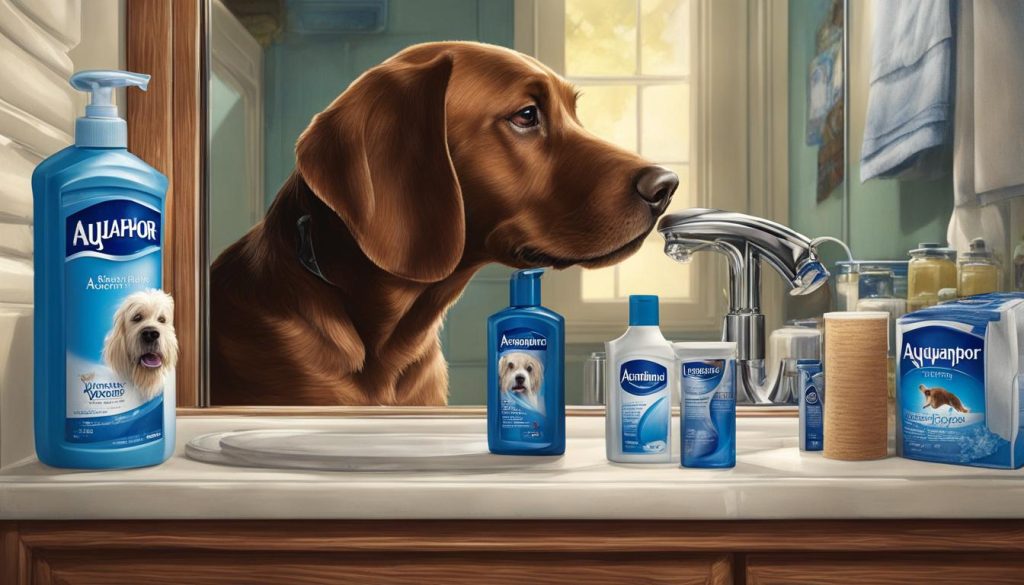
When it comes to dogs and Aquaphor, it’s important to understand the potential risks and benefits. Dogs may be attracted to Aquaphor due to its smell, texture, and taste, but it’s crucial to note that while Aquaphor is generally considered non-toxic to dogs, excessive licking or ingestion may cause an upset stomach. Dog owners should monitor their dogs’ interactions with Aquaphor and consult a veterinarian if necessary.
Aquaphor, a popular brand of over-the-counter ointment, is commonly used to moisturize and protect the skin. Its emollient properties help to lock in moisture and promote healing for dry, cracked skin. While Aquaphor can be beneficial for human use, it’s important to approach its use on dogs with caution.
While Aquaphor may provide some relief for certain skin conditions in dogs, it is crucial to consult with a veterinarian before using it. They can assess the specific needs of your dog, recommend appropriate treatments, and provide guidance on safe alternatives.
Natural Solutions for Dry Dog Lips
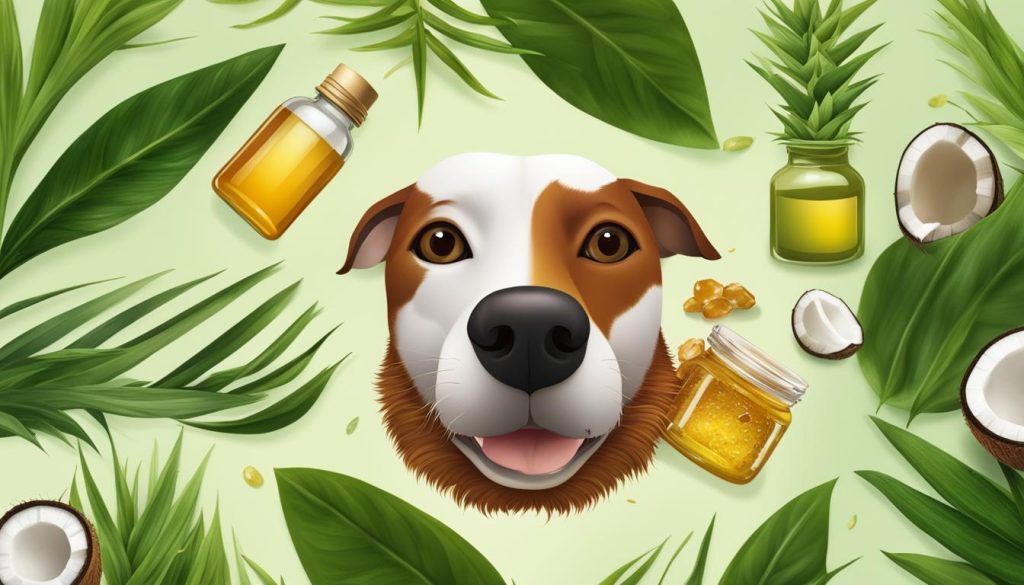
Dry dog lips can be a common issue for our furry friends, but there are natural remedies available to help moisturize and heal their delicate skin. One such solution is Snout Soother, an all-natural balm specifically formulated to address dry dog lips. Snout Soother contains organic, vegan ingredients that provide moisturizing, healing, and anti-inflammatory properties to soothe and nourish your dog’s lips.
Using Snout Soother is a safe and effective way to treat dry dog lips. The balm creates a protective barrier that seals in moisture and prevents further drying. It is easy to apply and can be used as often as needed to keep your dog’s lips healthy and hydrated. Plus, Snout Soother is safe if licked, so you don’t have to worry about any potential ingestion risks.
When it comes to caring for your dog’s lips, it is important to avoid using products that may be harmful or toxic. While Vaseline may be a common go-to for dry skin, it is not recommended for use on dog lips. Dogs are prone to licking their lips, and ingesting Vaseline can lead to an upset stomach and other digestive issues.
Instead, opt for natural solutions like Snout Soother that are specifically designed for dogs. Snout Soother provides the necessary moisture and healing properties to keep your dog’s lips soft and healthy. Soothe your dog’s dry lips with the power of nature and give them the relief they deserve.
Causes of Dry Dog Lips
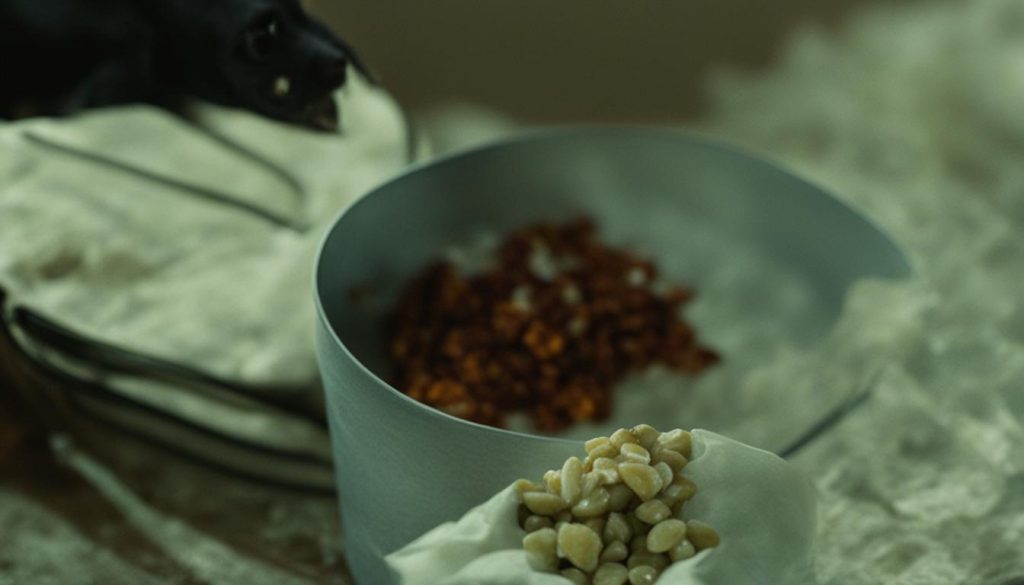
Dry lips in dogs can be caused by various factors. Understanding these causes is essential in addressing the issue and preventing recurrence. Here are some common reasons why dogs develop dry lips:
- Allergies or Irritants: Exposure to allergens or irritants, such as certain foods, chemicals, or environmental factors, can lead to dryness and inflammation of the lips.
- Jute Toys: Some dogs may have a sensitivity or allergy to jute, a material commonly used in toys. Chewing on jute toys can cause irritation and dryness of the lips.
- Low Humidity: Dry air can affect a dog’s lips, just like it can affect our skin. Low humidity levels in the environment can lead to dryness and cracking of the lips.
- Vitamin Deficiencies: A lack of essential vitamins, particularly vitamin E and B-complex vitamins, can contribute to dryness and flakiness of the lips.
- Dehydration: Insufficient water intake can result in dehydration, which can manifest as dry and cracked lips in dogs.
Identifying the underlying cause of dry dog lips is crucial for effective treatment and prevention. Consultation with a veterinarian is recommended to ensure proper diagnosis and appropriate management.
Adding Oil to Your Dog’s Food for Moisturizing
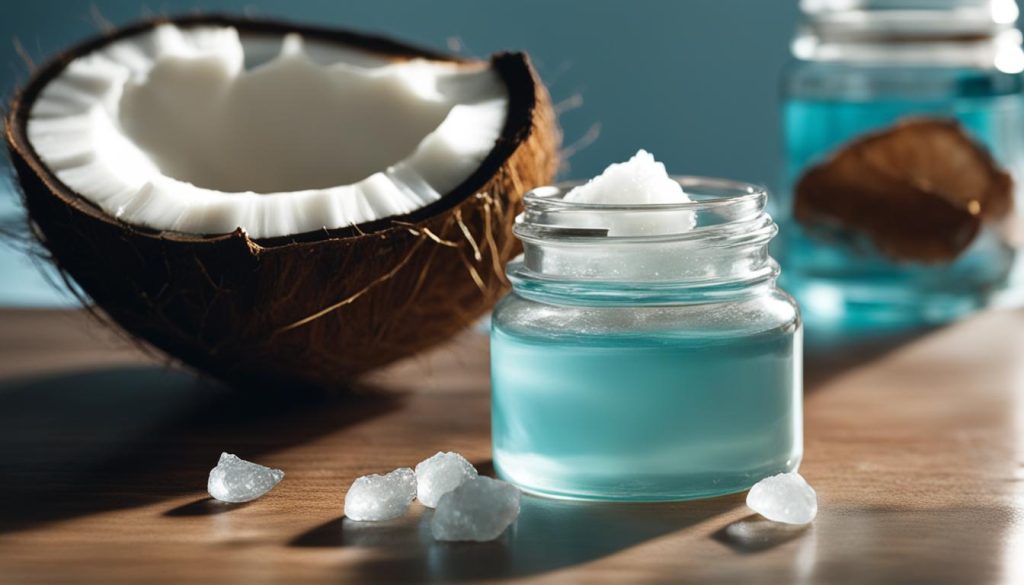
When it comes to moisturizing your dog’s dry skin, adding oil to their food can be a beneficial solution. One popular option is coconut oil, which is not only safe for dogs but also offers various health benefits. Coconut oil contains medium-chain fatty acids that can help improve your dog’s skin and coat condition, including dry lips. When adding oil to your dog’s food, it’s important to do so in moderation. Start with a small amount, such as one teaspoon, and gradually increase the dosage if necessary.
Coconut oil is known for its moisturizing properties, and it can help replenish the moisture in your dog’s skin, including their lips. Additionally, the medium-chain fatty acids found in coconut oil have anti-inflammatory properties that can soothe dry and irritated skin. However, it’s crucial to choose a high-quality, organic coconut oil that is free from additives or any harmful ingredients.
While coconut oil is a popular choice, there are other oils that you can add to your dog’s food for moisturizing purposes. Krill oil, fish oil, and flaxseed oil are all rich in omega-3 fatty acids, which can promote healthy skin and coat. These oils can also help alleviate dryness and itchiness in dogs, providing them with relief from uncomfortable symptoms.
| Oil Type | Main Benefits |
|---|---|
| Coconut Oil | Moisturizes skin, anti-inflammatory properties |
| Krill Oil | Rich in omega-3 fatty acids, promotes healthy skin and coat |
| Fish Oil | Source of omega-3 fatty acids, reduces inflammation |
| Flaxseed Oil | High in omega-3 fatty acids, supports skin health |
Please be aware that while adding oil to your dog’s food can provide moisturizing benefits, it should not replace proper veterinary care. If your dog is experiencing persistent dryness or discomfort, it’s best to consult with a veterinarian for a proper diagnosis and treatment plan. They can recommend the appropriate oils and dosages based on your dog’s individual needs.
Dangers of Using Vaseline on Dog Lips
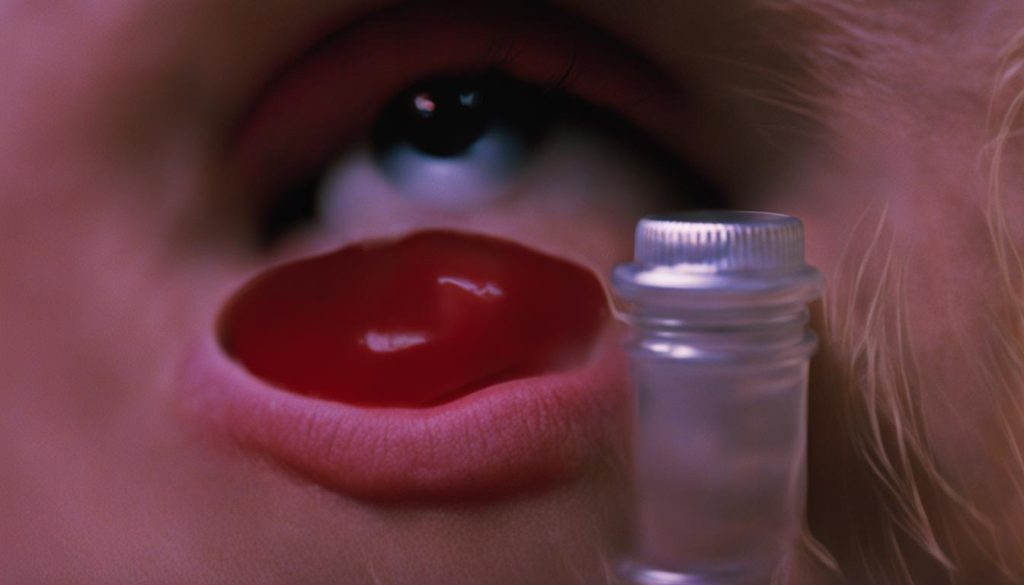
When it comes to moisturizing your dog’s lips, using Vaseline may not be the best choice. While Vaseline is technically non-toxic for dogs, it can pose certain risks if ingested in large amounts. Dogs are naturally inclined to lick substances they come into contact with, and applying Vaseline to their lips increases the likelihood of ingestion. This can lead to digestive issues such as diarrhea and vomiting.
Instead of using Vaseline, it’s recommended to explore safer alternatives that are specifically formulated for dogs. One such alternative is Snout Soother, an all-natural balm that provides moisturizing and healing properties for dry dog lips. With organic and vegan ingredients, Snout Soother is not only safe for your dog if licked, but it also helps seal in moisture and prevent further drying.
| Dangers of Vaseline on Dog Lips | Safe Alternative: Snout Soother |
|---|---|
| Vaseline can be ingested if applied to dog lips | Snout Soother is safe if licked by dogs |
| Ingesting Vaseline can cause digestive issues | Snout Soother helps moisturize and heal dry lips |
| Vaseline does not have antibacterial or healing properties | Snout Soother provides natural healing properties |
Using Vaseline on your dog’s lips may provide temporary relief, but it’s important to consider the potential risks and lack of beneficial properties. Opting for pet-safe alternatives like Snout Soother ensures that you’re providing the best care for your furry friend’s lips without the worry of ingestion or ineffective results.
Wrapping Up
After examining the facts, it is clear that while Vaseline may provide temporary relief for dog lips, there are safer alternatives available that offer more benefits. Vaseline does not possess antibacterial or healing properties, and prolonged use can actually result in drier skin over time. Therefore, it is recommended to consider alternative options for the optimal care and moisturization of your dog’s lips.
There are pet-safe alternatives like The Happy Jack Co. dog balms or Snout Soother that are specifically formulated for dogs and contain natural and organic ingredients. These alternatives not only moisturize, but also provide additional benefits such as soothing, healing, and antibacterial properties, ensuring your dog’s lips stay healthy and nourished.
While Vaseline may still have some uses for dogs, such as protecting paw pads or creating a barrier for certain skin conditions, it is important to be mindful of the potential risks and limitations. It is recommended to consult with a veterinarian to determine when and how to use Vaseline safely and effectively for your specific dog’s needs.
To summarize, while Vaseline may have its benefits, there are better options available for maintaining the health and moisture of your dog’s lips. By opting for pet-safe alternatives, you can provide your dog with superior care and ensure their lips stay in optimal condition.
FAQ
Is Vaseline safe for dogs?
Vaseline is technically non-toxic for dogs, but it can cause an upset stomach if ingested in large amounts.
Does Vaseline have any healing properties for dogs?
Vaseline does not have any antibacterial or healing properties and can lead to drier skin over time.
Are there safer alternatives to Vaseline for dogs?
Yes, there are safer alternatives specifically formulated for dogs, such as The Happy Jack Co. dog balms, which contain natural and organic ingredients that are safe if licked.
Can dogs get sick from ingesting Vaseline?
Yes, ingesting large amounts of Vaseline can lead to an upset stomach, vomiting, or diarrhea in dogs.
Why are dogs attracted to Vaseline?
Dogs may be attracted to Vaseline due to its smell, taste, and greasy texture. They naturally explore their environment through their mouths and may lick substances they come into contact with, including Vaseline.
Can Vaseline be used on a dog’s nose?
It is not safe to use Vaseline on a dog’s nose as it can be ingested and cause an upset stomach and diarrhea.
Are dogs attracted to Aquaphor as well?
Yes, dogs may be attracted to Aquaphor due to its smell, texture, and taste. While it is generally non-toxic, excessive licking or ingestion may cause an upset stomach.
How can I treat dry dog lips?
Dry dog lips can be treated with natural remedies like Snout Soother, an all-natural balm that moisturizes and heals dry lips.
What are the causes of dry dog lips?
Several factors can cause dry dog lips, including certain health conditions, low humidity, allergies or irritants, jute toys, vitamin deficiencies, and dehydration.
Can adding oil to my dog’s food help with dry lips?
Yes, adding 1 teaspoon of coconut oil, krill oil, fish oil, or flaxseed oil to your dog’s food can provide essential fatty acids that help moisturize and replenish dry skin, including the lips.
Can I use Vaseline on my dog’s lips?
It is not recommended to use Vaseline on dog lips as dogs are likely to lick it off, leading to ingestion. Snout Soother is a safe alternative that can be applied to dog lips without the risk of ingestion.
Are there any safer alternatives to Vaseline for dogs?
Yes, there are pet-safe alternatives like The Happy Jack Co. dog balms or Snout Soother that are specifically formulated for dogs and provide better benefits for their skin.






